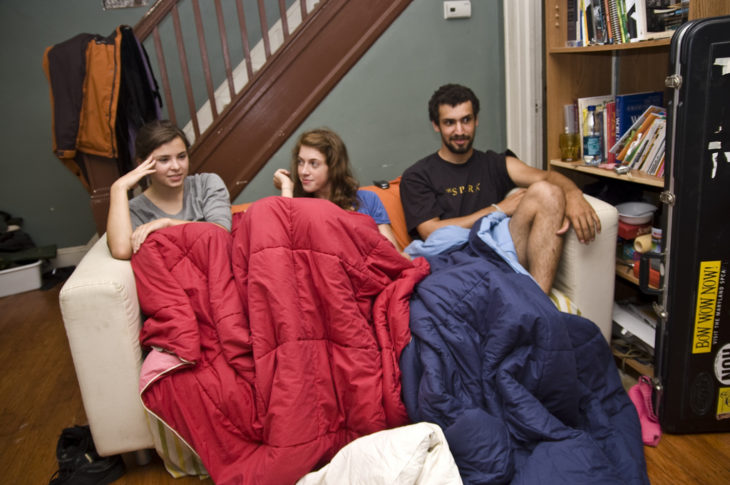New York City real estate causes many a housing arrangement made in desperation. If you live in NYC (or, for that matter, any city with insanely high rents), you likely know a few 30-somethings who still live with roommates or someone whose “convertible bedroom” is actually the living room with a room divider. The city is pockmarked with couples who moved in together more quickly than they would or should have, all citing the same very good reason: “It doesn’t make sense to pay two rents when he’s here all the time anyway.”
I had a shitty housing arrangement horror story in my mid-20s and hoped that would be my last. But then I wed a recent immigrant who needed a permit to work, a green card, and a job. Thus I found myself newly married and living with a roommate.

Source: MadameNoire
I met my husband, Kale, while he was in America on a year-long tourist visa. He was on sabbatical from a job back in Australia and living off his savings in a closet-sized apartment in Brooklyn. Marrying me meant giving up the job waiting for him back home. His bank account was dwindling and I couldn’t support us both on my blogger’s income alone, so it made sense for him to move in with me and my roommate in Astoria. Like most shitty housing arrangements, economic paucity forced our hand. The obvious bonus to cramming three people into two bedrooms was cheaper rent. Each of us paid only $600 a month — unheard of even in our relatively affordable neighborhood. That was a huge reason why my roommate, Sasha*, agreed to this arrangement in the first place.
I wasn’t so naive to think that that we three wouldn’t feel crowded. Another roommate is still another person who needs to use the shower on a Monday morning, another person playing Tetris with the leftovers in our tiny fridge. But at the start, it didn’t seem like we’d be living on top of each other: we rented the entire first floor of a house in Queens and had plenty of space. Our bedroom and Sasha’s bedroom were next to each other, but a living room, dining room and front room were on the other side of the house. Geographically, it seemed like a great, spread-out apartment for a couple with a roommate. Besides, Sasha was one of my best friends, someone I’d been close to since middle school. She got along with Kale well.
Maybe it would have been a great, spread-out apartment for a couple with a roommate. But we were a newly married couple who’d only spent nights at each other’s places and had never lived together before. I was still learning his quirks when it came to hanging wet towels; he was still getting a handle on my fussiness about kitchen cleanliness. And I’d had cleanliness problems with Sasha as long as we’d live together. It was hugely naive of me to believe my husband moving in with us would solve them. Instead, the problem was the same as before, only with more than a few of the Crate and Barrel glasses we got as a wedding gift broken in the sink.

Source: 6sqft
Moving in with two existing roommates/friends put Kale in a weird position, too: He wanted to be supportive of his new wife (and her fussiness), but he also wanted to keep the peace with Sasha. Kale is a lot more tolerant of messes than I am, infinitely more patient with people and unfailingly polite; I felt ashamed of myself for not being as unflappable as him, especially since Sasha was my friend to begin with. I spent the first year of my marriage biting my tongue so as not to be Mean Mommy to either of them, but especially not my husband.
It might seem like Sasha, Kale and I could have made a chore chart. Yet, counter-intuitively, having known Sasha nearly our whole lives made communicating my annoyances even more difficult. I didn’t want to offend her or be portrayed as a controlling asshole to our mutual friends or be so nitpicky that Sasha would feel unwelcome in her own home; she had, after all, lived there long before Kale and I had even met. So I kept my aggravation about housekeeping to myself as much as I could — even as it made me feel frustrated and resentful all the time. The balancing act of being both roommates and friends became increasingly delicate and tense.
Cleanliness was the root of our problems, but socializing as a couple with a roommate only upped the tension ante. Just like I wanted Sasha to feel welcome in her home, she wanted Kale to feel welcome in his. In her attempt to be friendly, though, she instead went overboard into being too friendly. There’s a certain intimacy with couples that comes from just sitting together quietly, existing in the same space without interruption. But neither Kale nor I felt like we could sit in the common areas and just watch TV or read a book when our roommate was around. Her presence grew increasingly grating as she would chat with us during the few moments we were able to be alone with each other — dressing before work, watching Hulu on my laptop, eating dinner. None of that was private for us. Both literally and figuratively, roommates have an unspoken agreement to avert their eyes when they see someone undressing through a partially-closed door. Instead, we had to shut the bedroom door all the time just to talk privately. Towards the end, we ate all our meals in bed with the door shut.

Source: MarketWatch
As for other activities that married people do with the door shut? Our friends assumed our sex life must have suffered, but it really didn’t. Anyone with a roommate learns to make do: We mostly confined sex to right after work, nights that she slept at her partner’s, or weekend mornings when she went for a long run. What was actually compromised were those little moments of marital intimacy like walking naked into the kitchen to get a glass of water or scampering to the bathroom in flagrante to clean up. We had to have robes and sweatpants at the ready at all times and that was a bigger boner-killer than any noises someone might hear through thin apartment walls.
From the beginning, Sasha always knew that the arrangement would be temporary and that eventually Kale and I wanted to live by ourselves. It wasn’t until he got a job and brought in income that we were in a position to handle the rent increase of getting our own place. That took 13 months of living with a roommate as newlyweds. By that point, living as a threesome chafed everybody; there wasn’t a question that the arrangement had to end soon. I loved my neighborhood and wanted to ask Sasha to move out so we could stay in the apartment; Kale wanted to move back to Brooklyn and have a fresh start in a new home. I came to see that he was right about that and we rented our own place, an apartment in the Brooklyn neighborhood of Fort Greene that now feels truly “ours.”
Relationships are supposed to be an island, special because it’s inhabited by just two. We never had that, exactly, because our island always had a visitor. In the three months Kale and I have lived by ourselves in Brooklyn, it’s felt like a restart of sorts for our marriage — in ways both good and bad. We are learning again about each other’s cleanliness quirks. We are dividing up chores anew. And if a splash of marinara sauce sits on the counter for three days straight, I know who to give the side-eye. It has put more intensity on our marriage — there isn’t a third person to conveniently blame if a piece of mail goes missing or the garbage can starts to stink. But my friends tell me I look happier. I feel happier.

Source: verilymag.com
What I’m not happy about is how my friendship with Sasha was mortally wounded. Instead of my husband salving a fractured friendship, us three living together was the catalytist for ending it. I feel guilty for getting us into a housing arrangement that I should have seen from the beginning wouldn’t work. I can’t shake my own feelings of resentment, though, for all the frustration and lack of privacy Kale and I lived through when we just wanted to be floating off on a cloud as newlyweds. I wish Sasha well and feel truly disappointed about how everything ended. Still, if asked, I wouldn’t advise any newly married couple to live with a roommate if they can help it.
* Name has been changed.
Original by Jessica Wakeman
